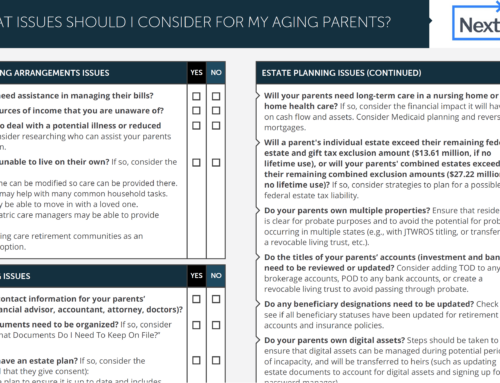Next Mission Answers Ten Questions For A Financial Planner
In a previous article, I discussed why it’s important to perform due diligence when you’re hiring a financial planner and how military members have unique requirements they should seek to address because of their benefits.
Based on the questions I compiled, I believe it’s only fair and transparent that I publish my answers.
1) Will you have a fiduciary duty to me?
Yes. I will always put your interests first with any recommendations. I have taken this pledge as part of my membership in several organizations and as part of my certification. While this doesn’t preclude potential conflicts of interest, I will always be fully transparent so that you can make the best-informed decision.
2) What is your education, qualification and experience?
After my 25-year Air Force career, I decided I wanted to do something different so most of my formal education is not in finance. I have a Bachelor of Science in Computer Engineering from Rochester Institute of Technology. The Air Force also sent me to get Masters’ degrees from the Naval Postgraduate School, Air Force Institute of Technology, and Air War College.
I am a CERTIFIED FINANCIAL PLANNER® professional. I am also a Chartered Financial Consultant® having completed my coursework and certification through the American College of Financial Services. I also hold the Military Qualified Financial Planner and Certified College Financial Consultant designations.
I launched Next Mission Financial Planning in 2021.
3) What services do you offer? Would you say you’re more planning-focused or investment-focused?
Next Mission Financial Planning offers both financial planning/advising and investment management through ongoing client relationships. Our goal is to understand your goals and dreams and partner with you to make them reality. We believe comprehensive financial planning should be the basis for any long-term investment decisions so the plan should always come first.
4) What type of clients do you typically work with?
We primarily work with military members and families and retired military members or families and this is our core area of expertise. We do have some clients who don’t have any military affiliation. That doesn’t disqualify you. See up a time to talk (LINK) and we can discuss your situation and assess the fit.
5) Do you understand military benefits? Can you advise on the Thrift Savings Plan (TSP), Blended Retirement, Tricare, Survivor Benefit Planning, as well as lesser-known programs like the Savings Deposit Program during deployments?
As a 25-year Air Force veteran, I’m intimately familiar with military benefits. I’ve invested in the TSP since it was open to military in 2001. I can also advise on military transition and retirement through the Transition Assistance Program (TAP) and the Veterans Administration (VA) process as well as available resources.
6) What is your approach to financial planning?
Comprehensive financial planning should look at your complete financial life as well as understand your goals and intentions for your resources (time, talent and treasure). Comprehensive financial planning should typically cover insurance, tax, investment, retirement and estate planning areas that applicable to your situation. Our process to build your initial plan is typically completed over 3-4 meeting over a 3-6 month period depending on complexity and client availability.
Once the initial plan is complete, we have 2 scheduled meetings each year. Usually in the spring and fall with additional meetings for specific topics as needed by the clients.
7) What is your approach to investment management or what is your investment philosophy?
My overall investment philosophy is to create broadly diversified portfolios using low-cost ETFs. It’s very hard to beat the market and too often investors end up chasing the hottest things after they gotten expensive and then selling them at the wrong time. I find the slow and steady approach works better.
8) How do you get paid?
You will pay me directly for my services. I offer flat-fee ongoing planning or planning with investment management based on complexity and assets. I also also over project-based planning for limited scope or 1-time plans.
9) How much do you charge? What are my all-in costs?
Ongoing planning starts at $4,200 per month.
10) Have you been disciplined by a regulatory organization or have any complaints on your record?
No. You can check that at the SEC’s Investment Advisor Public Disclosure (https://adviserinfo.sec.gov/) website.



